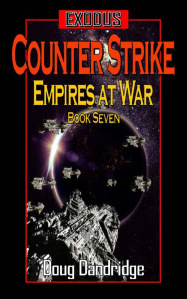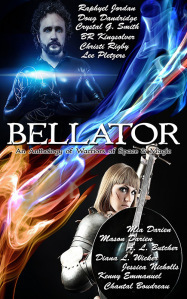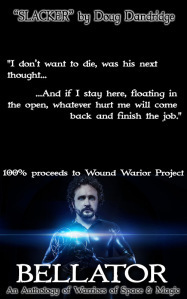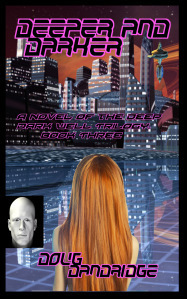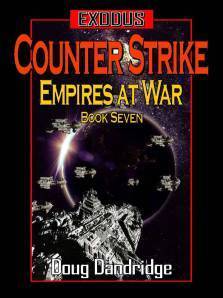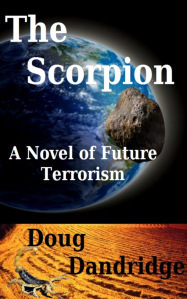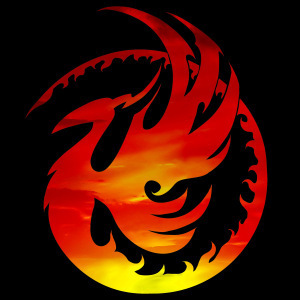Doug Dandridge's Blog, page 14
August 20, 2014
Exodus: Empires at War: Book 7 is out.
Last night I quietly put Exodus: Empires at War: Book 7: Counter Strike up on Amazon. I say quietly, since probably the only people who knew it was coming were people who followed or friended me on Facebook (hint, hint). Normally I do at least a blog entry or two trumpeting the release before hand, along with a Twitter campaign and a newsletter release. Truth be told, I had too much to do, trying to finish up the book, working on another at the same time (I can only do so much reviewing and proofing in a day), trying to buy a house. This time I only mentioned putting the book up on Facebook, and, at three o’clock Eastern time, a fan in Singapore noted that it was up and he had bought a copy. Thank you, Paul Mah. One of the many interesting people from around the World I have met since embarking on my self-publishing journey. Larry Southard, another fan, this one from Florida, not only got a death in the book of cosmic proportions, he also garnered the dedication. What can you say about a guy who wears a t-shirt to a major convention (LibertyCon) with my book cover on it. I will continue to tweet it over the next couple of weeks, and will send out the newsletter in a couple of days. The newsletter itself would be more important to me if I had more subscribers, only a little over two hundred so far. The book itself, Exodus: Empires at War: Book 7: Counter Strike, can be found on Amazon at the link. It is already, in its first, not so complete, day, in the top 11,000 of paid Kindle sales, and in the top one hundred in several genre categories.
Sales are going well. In a little under two years I have sold over 94,000 books, the great majority ebooks, but also some paperbacks, and now some audiobooks of Exodus: Empires at War: Book 1. Three hundred audio books in less than a month. Not sure if that is good or bad, but the producer jumped on board to put out book two, so it must be doing good enough. The next project up is the fourth book of the Refuge series (or fifth by some reckoning), my second best, and not near as popular as Exodus, series. Some wonder why I even write in it if I’m not getting the sales. But it was put out there as a series, and each book has at least two thousand sales. I believe I have an implicit contract with those readers to deliver the rest of the series, so it will be written, one book this year, another the next. And now for the obligatory excerpt from Exodus 7.
“Did we really have to bring along so much of this shit?” asked Petty Officer First Satrusalya, holding one end of the large container by a handle. “This stuff gives me the shakes.”
Cornelius looked at the man, who was larger that he was. Being an augmented Naval Commando, using the same process the Ranger had undergone, that meant he was stronger, and just a bit slower due to his mass.
“I don’t really like it either,” said the Cadet Lieutenant, eying the tube that was a magnetic containment device filled with one of the deadliest known substances, negative matter. Only antimatter was more feared. Negative matter canceled out itself and normal matter on contact. Once out of its containment there was nothing that was proof against it. The only positive thing about the negative matter was that it could only cancel out the same mass. “But I like the idea of a hundred gigaton or larger bomb going off near me even less, and this stuff may be the only thing that will cancel it out before it kills us.”
They were moving quietly along the wall that separated the corridor from the kilometer thick supercable that was one of the supports the aliens had to sever to destroy the station. Five Rangers and the other Naval Commando were in the lead, crouched low, weapons ready. Cornelius walked just ahead of the two men carrying the container, while the last Ranger took up the rear, thirty meters behind and his watch covering that direction.
All of the men were veterans, and Cornelius trusted them to do their jobs competently. Cornelius had been in special ops for a far shorter time than most of the men, and was not yet a commissioned officer. The double award of the Imperial Medal of Heroism made him a trusted leader, however, someone these tough warriors were in awe of.
The Commando in the front, Petty Officer First Khrushchev, the leader of that element due to his experience operating aboard spaceships, held his hand up and knelt down, waving the officer trainee forward. Cornelius ran to him, making no sound, and came to a kneel beside him. He didn’t even have to ask the man what was going on. His hypersensitive ears picked up the sound of fighting, both directly ahead and to the left down another corridor. The Marines must be to the front, and Chung and his people to the left, he thought. The Marines, in heavy combat armor, would be trying to blast their way through the Cacas arrayed to protect the bomb. The IIA Agents were a decoy force, hitting the Cacas down another angle of approach, trying to draw the enemy away from this one.
“We’re getting close,” he whispered to the Commando, who nodded back. They were avoiding com link for the moment, thinking that the enemy might pick it up so close to their lines. Rangers and Commandos were trained to operate without electronics. At this time they were carrying more powerful weapons than they usually did, and two of the men had the backpacks of laser cutters on their backs, just in case.
“I hope they don’t set the damned thing off before we get to it,” said Sergeant Pasco, one of the Rangers.
“I wonder why they haven’t already?” asked Specialist Owusu, his eyes scanning the corridor ahead.
“They want to set them all off at the same time,” said Cornelius. “Not give us a chance to make repairs before they sever another cable.”
He listened for a second more, then waved his hand to get everyone moving. They hadn’t gone more than fifty meters before Khrushchev was again raising his hand and stopping the formation.
“They’re right ahead,” said the Petty Officer, gesturing with his rifle down the corridor.
Cornelius listened carefully, the movement of the armored Cacas sounding from ahead. We need to get through them quickly. Then hit the Cacas that are facing the Marines from behind. He was starting to wave the other men forward when a particle beam came ripping down the corridor and struck Khrushchev in the chest.
Filed under: Alien Invasion, Antimatter, Armor, eBooks, Far Future, Fusion, Future Prediciton, Future Warfare, Genetic Engineering, Kindle, Military, Nanotechnology, Nuclear Weapons, Robots, science Fiction, self publishing, Wormholes, Writing Tagged: Amazon, empires at war, Exodus, Exodus series, Exodus: Empires at War, Exodus: Empires at War: Book 7, Facebook, Naval Commando, Refuge: The Arrival


August 4, 2014
Bellator is Live Starting Today.
Bellator is out today on Amazon, Createspace, Barnes and Noble and Smashwords. The ebook is $3.99 on all outlets, with all proceeds going to the Wounded Warrior Project. A small price to pay for twelve stories, six each of fantasy and science fiction, all featuring warriors, and for a very good cause. My short story Slacker, a tale from the Exodus: Empire at War Universe, will only be found here. An interview with the Editor, author Mia Darien, can be found on her website, with quotes from all the authors about what they think is worth fighting for. Pick up your copy today at your favorite outlet. It is definitely a project I am proud to be involved with.
I first got involved in this project through an email from author Raphyel Jordan, who I met at the Superstars Writer’s Conference in Colorado Springs. In an earlier blog I talked about this conference, put on by bestselling author Kevin J Anderson and his wife, Rebecca Moesta. Raphyel asked if I would be interested, and of course I was very much so, so he put me in touch with Mia. I decided that since the anthology was benefiting Wounded Warriors, I would write a story about a Marine who was wounded and continued to fight, accomplishing his mission despite all of the pain he had to go through. I saw the cover art back in June and was very impressed with it. So, give it a try and let us know what you think.
Filed under: Alien Invasion, Alien Life, Armor, Conferences, eBooks, Fantasy, Future Warfare, Kindle, Military, Near Future, Past, science Fiction, self publishing, Space Navy, Writing Tagged: Amazon, Barnes and Noble, Bellator, Createspace, fantasy and science fiction, Kindle, Mia Darien, Raphyel Jordan, Smashwords, Warriors, Wounded Warrior Project, Wounded Warriors


July 25, 2014
The Deep Dark Well 3 is Out, Exodus 7 On The Way.
Today was the release date of Deeper and Darker, the third volume of The Deep Dark Well trilogy. In Volume 2, To Well And Back, Watcher was captured by the Nation of Humanity. Pandora Latham, his lover from forty thousand years in the past, must organize a rescue mission to save Watcher from the hands of the New Galactic Empire, which intends to try him for the sins of his alter ego, Vengeance. The New Galactic Empire has the number, the New Galactic Confederation of Watcher and Pandi has the tech. The question is, will it be enough? Or will the brainwashing tyrant of the New Galactic Empire, the Immortal Emperor Alphonso Kitticaris, reign supreme over a slave empire with no end. Right now the book is available on Amazon here. Later next week I will try to get the paperback version up on Createspace. I have a finished first draft of the first book of a second trilogy set in that Universe, but due to the demand for Exodus, I will be waiting to put it out.
Exodus: Empires at War: Book 7: Counter Strike, should be available by the last week of August. Currently I am at 60,000 words of the hopefully 120,000 word novel. A can be seen above, the cover is ready to go. After that novel I will finish the fourth book of the Refuge series. It will require at least another book after that one to finish off that series, or at least the beginning, though I still have not given up hope on it as a viable effort in the future. And then on to the next Exodus novel. And now, an excerpt of Deeper and Darker.
I’ve got to get out of here, thought Watcher as he severed the link with the ship’s computer. According to the navigation computer the battleship he was on, as well as the rest of the force, was a little over halfway to its destination. They were in hyper VII, with a pseudospeed of over thirty-five thousand times light. The borders of the New Terran Empire were over three thousand light years from the Supersystem, and the core system of that polity was a thousand light years from that border. It was a fifty-two day trip overall, counting time to accelerate and decelerate back down, one that his own ships could make in a little over thirteen days. And just our bad luck that the bastards had to be so close to us.
He had been checking out the databases about the Empire, and what he saw was chilling. They had quadrupled the size of their empire in the last hundred years, and it was increasing at a geometric rate. At its present expansion it would double again in the next twenty years, then again ten years later. And most of the developing powers in that space didn’t have a prayer. There were twelve other multi-star system governments in that threatened space, and none of them stood a chance against the Empire.
It wouldn’t be so bad if they weren’t complete dicks, he thought, recalling more of the information he had gleaned from the databanks. The Empire was ruled by a single human male, one who had lived for over five hundred years, and looked as if he had no intention of dying anytime soon. It was a totalitarian regime that brooked no dissension or interference with its plans and policies. Just the kind of government Watcher despised.
Watcher linked back in with the ship, this time going beyond the safe confines that he had set himself, going straight into the heart of the security programs. He had been here before, for fleeting instants, checking out the sensitivity of the programs to intruders, learning what he could get away with. Now he took some steps beyond those boundaries.
He had determined that now was the best time to escape, while they were still outside the borders of the Empire, while he only had to escape and avoid these ships. The only problem was, he still didn’t know if that was possible.
He looked through the security system and noted that all the nearby corridors were empty. There were security personnel on duty in the surveillance room that oversaw this block of cells (and there sure were enough of those on what was supposed to be a warship). The rest of the corridors leading to his planned destination were as empty as could be during the late night cycle of the ship, when the only people up were those who had duty stations to man.
Watcher’s mind, the most powerful organic data processing instrument in the Galaxy since the disappearance of the almost legendary Ancients, moved with ease through the systems of the ship. For a moment he had the access to make the ship do anything he wanted. That access was only momentary, and would give away the game, but he could do it.
He set the security systems to indicate that his cell was occupied, and that the door had remained closed, even while it was opening to his front. The sensors at the security station would continue to monitor his calm heartbeat, while the visual pickups would show a lifelike image of himself, pieced together from hundreds of hours of surveillance recordings, sitting on his bed, or sleeping, or any of a thousand other actions.
Watcher slipped through the door, glancing in both directions, his superior mind filling in every detail with that one look. The cell door closed behind him, and he started moving the direction he wanted, his own location appearing in his optical centers on a schematic of the ship.
The battleship massed fifteen million tons, and measured well over two kilometers by eight hundred meters. There were six thousand people aboard, spacemen and marines. If he had to fight his way through them all he was dead. But so far it was looking very good that he might be able to sneak through to where he wanted to be. After that, it would be up to his skills at manipulating the computer to get off the ship and away, spoofing their sensors and dropping off their plot.
The armory he had scoped out was ahead and to the right. Its lock was no more advanced than that of his cell, and the thick door slid in and to the side as he approached. Of course, there was an inner door on a separate circuit, but that was only a microsecond of effort to open it in the same way. Inside the armory was rack after rack of weapons, as well as some various sizes of body armor. No powered armor, which was a bit disappointing, but not really unexpected. Naval powered armor would be stored where the crew could get to it during battle alerts, while the marine version would be kept by their quarters.
It took a little over a minute to strap on some of the body armor, breast and back plate, shoulder pads, forearm and thigh guards, and a tactical helmet. He strapped on several hand weapons, then chose the most powerful rifle he could find. Again, it was not what he would have preferred, but it was the best he could get at the moment.
The armory sealed itself up after he left, and he continued on his way, tapping into the security system to see ahead of him, making sure he was not running into any of the crew. There were some tense moments there, as he saw people wandering halls on several occasions, and once an armed patrol, which made him wonder how much this Admiral trusted his own people
It’s just ahead, he thought, walking down the corridor, his booted feet not making the slightest sound. He gripped the particle beam rifle in his hands, ready for any betraying movement that would warn him of an enemy. The weapon seemed somewhat primitive compared to what he was used to, and he was sure that it was not in the same class as what he had carried off of the station, but hopefully powerful enough to defeat their own armor. The helmet on his head had its com activated, at least the receiving portion of the tactical communications link.
He pushed a small probe around a corner that was the last before the main corridor that led to the hangar. The probe was a small fiber optic line that was flexible enough to shape to any desired configuration. It was attached to his helmet, and gave him a view of whatever the end was pointed to. Now it was giving him a view of two battle suited Marines standing before the hatch that led into the hangar, particle beam rifles in their hands.
Now how in the hell do I get past them, he thought, knowing that if he shot the men an alarm would definitely sound. That concern was rendered moot as said alarm went off, a loud klaxon that sounded through the corridor along with red flashing lights.
“The prisoner has escaped,” came a voice over the tactical com. “Repeat, the being known as Watcher has escaped and is at large on the ship. He is to be considered extremely dangerous.”
So much for caution, he thought, crawling around the corner to expose his head and rifle, sighting in on the first of the Marines, who were now alertly looking up the corridor. He developed an instant sight picture and squeezed his trigger, connecting the red beam from the end of his rifle to the faceplate of the Marine. He kept the beam in contact for more than a second, not sure of how strong it was. The faceplate dissolved in a flash of vaporized alloy, followed by a spurt of reddish steam as the beam demolished the face behind it. The Marine dropped, while his partner swung his rifle around and fired at Watcher, putting his beam just above the superman.
Shit, thought Watcher, as he scooted back behind the corner, the searing heat of the near miss blistering the flesh on his neck. He had made an estimate of the rifle’s power, and while definitely not in the class of his own tech, it was powerful enough to kill him quickly. He expects me to come crawling around again. He’ll be ready for that. So I need to do something different.
Something different was to come rocketing around the corner, leaping forward, his rifle tracking onto the standing Marine, sending a beam out that struck the enemy’s weapon and the hand that was holding the forward grip. The Marine yelled and dropped his rifle, and Watcher swept he beam up into his helmet.
He ran to the hatch while trying to link with the computer and open it. His mind ran into a wall, the security systems up and alerted. Watcher stepped back, aiming his rifle at the hatch with a low expectation of success, but not knowing what else to do. He triggered the beam, letting it eat into the alloy of the hatch. Some metal vapor spurted into the air, but he could tell right off that it wasn’t enough. Thirty seconds of fire and the beam died, and a quick look at the rifle showed an empty proton pack.
He pulled the used pack out of the rifle while looking at the superficial gouge in the hatch. Just as he pulled a new pack from the belt, he heard the approach of armored footsteps, and looked up to see a number of Marines and Spacers heading his way, weapons pointed menacingly.
“Drop that weapon and stand against the wall,” said the Naval officer who was leading the group. “Do it. Now.”
Watcher didn’t think they would be very happy with his killing of two of their own. And I sure don’t want to see what they’re going to do about it. With that thought he slammed the proton pack home and started to close the port.
The sonics sounded, and his muscles quivered as they tried to put him down. He raised his weapon, trying to sight in on one of the enemy. His vision was blurred, he couldn’t see anything, but still pulled the trigger, sending a beam down the corridor. The vibrations intensified as more sonic weapons were brought the bear, and the superman fought against the darkness that was attempting to engulf him. With a sigh consciousness left, and first his rifle hit the floor, then his body, as everything went black.
Filed under: Alien Life, Antimatter, eBooks, Far Future, Future Warfare, Genetic Engineering, Intelligent Life, Kindle, Military, Quantum Physics, science Fiction, self publishing, Wormholes, Writing Tagged: black holes, Deeper and Darker, Exodus, Exodus series, Exodus: Empires at War, New Galactic Empire, Pandora Latham, science, Space Warfare, Supersystem, The Deep Dark Well, The Donut, Watcher


July 22, 2014
Ken Ham and Those Damned Aliens
Normally I wouldn’t bother posting on something like this. I truly believe that everyone has the right to their own beliefs. If you want to believe in Thor, Gozer, Cthulu, that alien spirits arrived among us millennium ago, or one of the more established religions, that’s your choice, just as it is my choice to ignore those choices if I wish. Normally I just ignore what I consider the more foolish of the people who want to push their agenda on the rest of us. I believe in live and let live for the most part, with the exception of terrorists and people who are willing to use force to make others bow down to their religious tenants, like at least one well known religion here on Earth. I have friends on the far left, the far right, who don’t believe anything or are very strong in their particular faith. I get along with all of them, which is sometimes quite the balancing act. I consider myself a moderate who believes in science above all, the knowledge we have accumulated through time that has led to our understanding of the Universe, and our development of the technologies that allow us to live as we do. I am open to learning, to changing my views if someone can give me the information to base that change on. But there are others out there who believe what they believe, and no amount of evidence will change their minds. Ken Ham is one such individual. The self proclaimed champion of Creationism. You might remember him as the guy who debated Bill Nye the Science Guy about Creationism. Well, Ken dropped yet another bombshell onto the internet, like a turd from a seagull flying over the beach.
The first article I saw was posted on Facebook, from the internet journal, Raw Story. I clicked on the article and read the humorous proposition that good old Ken put forth. That if there was any other intelligent life in the Universe, it was doomed to hell because they had never received salvation. Now first off, this seemed like a terrible proposition from a loving God. I mean, who would make an intelligent species, only to doom them to suffer an eternity in an afterlife after they died. Generation after generation, for thousands of years (of course, Ken only believes the Universe and Earth are 6,000 years old, despite the ton of evidence to the contrary). From the Raw Story page I went in search for Ken’s own site and the original article, from the Answers in Genesis Blog. Now, to be fair, Ken did not really say that all of the millions of alien races that probably populate the almost infinite Universe are going to hell. He argues that there are no aliens, that the God he believes in (which was not the same one I grew up with by any means, though they have the same name) would not create any other life forms, because Earth was specially created, out of the trillions of trillions of planets orbiting the hundreds of billions of stars in the hundreds of billions of Galaxies in the observable Universe. And in his wisdom he placed this special place around a mediocre star in a small subarm of one of the major galactic arms, of a mediocre Galaxy. One would think the planet would be placed around a blue supergiant in the center of the largest galaxy of them all, a truly special place and a glory to its creator. I know, a Supergiant only lasts for mere millions of years before going into supernova, but if the Universe is only 6,000 years old, that shouldn’t be much of a problem.
So, he didn’t really say all aliens were going to hell. What he said was there couldn’t possibly be any aliens, because we are so special and stuff. And, most outrageous of all, he called for an end to the space program and the search for extraterrestrial life because his dogma didn’t believe in such. Now, as I stated earlier, I really don’t care about the religious beliefs of others. Well, in this case I do. Why? Because if science were based on his creationist views, we would not have any vaccines, satellites, air travel, computers, and all the other things we depend on today. Sure, engineers and medical specialist constructed most of these modern miracles, but they were based on the solid science that a man such as Ham denies, even while he makes use of it to spread his message of there’s nothing new to learn in the Universe. People like him would love to see us back in the Bronze Age, sacrificing sheep on fires so his God could get a whiff of the smoke.
I don’t know that there is alien life. I also don’t think our world is special enough to be the only home to life in this enormous Universe. I may be wrong, but once we search the last large rock in the Universe and find none (if I’m still alive, not even a starter) I will admit my belief is wrong. I also believe that among what I think will turn out to be trillions and trillions of planets with life on them, there will be other intelligent life forms. Someday we may meet them. Hopefully we will be of equal or greater technology, because history has shown us what happens the the technologically inferior cultures in such meetings. If they are superior we on’t have much choice as to the meeting ground. And if we meet other intelligent life, then people like Ken Ham can tell us that they are demons or damned, because they are not special creations like we are. Of course people like Ken Ham and his views of religion would probably not live more than a couple of generations past such a meeting, as the stronger culture also normally converts the weaker to its own belief system.
Filed under: Alien Life, Far Future, History, Intelligent Life, Near Future, Space Program, Websites, Writing Tagged: Alien Contact, Bill Nye, Creationism, Earth, God, Ken Ham, Raw Story, Religion, The Universe


July 9, 2014
The Politics of Science Fiction
I have been reading an awful lot on the internet recently about the battles going on in the Science Fiction Writer’s Association (SFWA). What really strikes me as bizarre about this battle, between the Liberal and Conservative writers, is how vehemently both sides are attacking the other. I don’t really fit into either political camp. In fact, I would have to start my own party in order to have an organization that fits my views perfectly. I used to call myself a liberal, as I do care about what happens to people in general, and did enough work in social services and as a therapist to see how some people really get the raw end of the deal. But my form of liberalism was very different than what most people seem to subscribe to today. I believed in free thought, a helping hand, equality, not always following the same political line as my Southern Democrat parents. In common sense environmentalism (and yes, I love animals, and don’t really like the idea of species going extinct through our actions. Not against killing a deer that one of millions, but shoot that last snow leopard, and I’m pissed. Don’t agree, too bad. I’m not telling your what to believe, only what I do.) Not marching in lock step with the majority just because they are the majority, not following the party line because the party says you must. I still get aggravated by political emails that tell me I must feel enraged about some decision or other. I can get mad over some of the stupid decisions of politicians on both sides, but I am not in permanent state of rage like some people, and often I can laugh at the things that enrage some other people. I am also pro death penalty, but only for mass murders and killers for hire. The biggest problem I have with putting killers to death was that, if a mistake were made, you could not bring them back. But people who kill many, or for money, can normally be convicted with absolutely no doubt. I was and am still promilitary, which means I think we need a strong military with all of the tech and equipment we can give them. But not that we should sacrifice them for no good reason. I was a soldier myself, and really wouldn’t have liked being sent off to do for something completely stupid for no reason. But the people in charge were smarter than me, you might say. They know what they are doing. And I would have to say that in many cases you are wrong. I was also always strong Second Amendment, having owned a gun since I was nine, and learning to shoot at eight. I still have them, and feel that how many I have is my own business. Now I find myself leaning a little more toward the conservative side, with a libertarian slant., though I probably won’t vote for either major party in the next election. So, what in the hell does this have to do with the battle in Scifi between political persuasions.
Mostly this. I really don’t care what the political persuasion of an author is. I have read works by rabid fascists and card carrying communists. I really didn’t care about their political views, the same as I don’t care much if an actor subscribes to what I consider a nutty religion (most people can guess that one in Hollywood), or was a draft dodger in his youth. I want a good story, plain and simple. A story I can enjoy, with enough detail to make it interesting and believable (or allow me to easily suspend my disbelief). I love military scifi, stories that explore wars of the future, not because I want those wars to occur, though I have enough of a real world view of humanity to be sure war will be around for a long long time. No, because I find the whole concept of people battling with high tech fascinating. Great characters are a plus, especially people who are likable, but even more importantly people who are strong, who fight back, who do something, even if their decisions are bad. Not people who cower in a corner complaining about what victims they are, waiting for someone else to come to their rescure. And stories where something good survives at the end, no matter the crap the protagonist had to go through to get there. What I do not want is a story that tries to beat me over the head with a political viewpoint as if it is my own (when most probably it is not), and shows what evil bastards the human race is made up of. Hey, I’m human. I want to see a future like the one shown in Star Trek, where we are judged by our abilities, with no concern whatsoever for race, ethnic group, even species. Post apocalyptic stories? Some can be good, but I still want to see a triumph. A story with a horrible ending for all can be interesting, once in a while, but not all the time. Why would I want to beat my psyche down with a continuous diet of those kind of tales.
Some people seem to think that whatever a writer produces has something to do with their personal feelings and psychological makeup in general. I have been accused of being an imperialist because I write about Galactic empires. Just like other authors have been accused of being misogynists or racists because they have such characters in their books. I think this mostly happens because people who read the stories that espouse a certain political agenda expect the writer to be pushing his own agenda. As Freud said, sometimes a cigar is just a cigar. And sometimes that SOB character is just a character, the product of an imagination that is part of a mind that really does not think like that. I will continue to read what I like. I still like to read Howard and Burroughs, who many people today consider racist authors. I consider them men of their time, to be judged in their time. Just as we will be judge by others in the future as products of our own time and place, if the Universe is just.
Filed under: Conferences, eBooks, Edgar Rice Burroughs, Fantasy, Far Future, Future Prediciton, Future Warfare, History, Kindle, Military, Movies, Near Future, Plotting, science Fiction, self publishing, Titles, Tropes, Writing Tagged: Conservatives, Liberals, Libertarianism, Misogyny, political views, Racism, Robert E Howard, Southern Democrat


June 30, 2014
The Little Con That Could: LibertyCon
This last weekend was my very first LibertyCon, and it won’t be my last. Thank you Larry Southard for sparking my interest in this Con. For those who don’t know, Liberty is a literary con, or literature con, whichever way you want to express it. It centers around science fiction and fantasy authors and their works. Baen books is a big part of LibertyCon, though definitely not all of it. I looked up some of the history of the con before I want, searching their lists of past guests of honor and such. Larry Niven, Jerry Pournelle, A E van Vogt, Robert Adams, Fred Saberhagen, Harry Turtledove, Kevin J Anderson, L Sprague de Camp, Ben Bova, the list goes on and on. Not bad for a small con in Chattanooga, Tennessee. This year the Author Guest of Honor was my friend Jody Lynn Nye, and other guests included Travis Taylor, John Ringo, Michael Z Williamson, Todd McCaffrey, Timothy Zahn, David Drake, Sarah Hoyt and Charles Gannon. Quite a list that was not inclusive of all the authors and scientists that were there. Publishers Toni Weisskopf and Bill Fawcett were also there, along with Baen Editor Jim Mintz. Now we are talking some very big names in the industry, Hugo and Nebula nominees, best sellers, and in the main people whose work I admire, respect and enjoy.
Liberty is held at the Chattanooga Choo Choo hotel and convention center. It boasts three hotel buildings, of which two are reserved for Liberty. Now, these are not the thirty floor megahotels, of which DragonCon has four, plus the many outliers. I don’t know how many people attended Liberty, but it couldn’t be more than a thousand, probably much less. It was never crowded, even the attached restaurant was never filled, even for breakfast and lunch. It was a very intimate setting, and if there was an author, publisher or scientist you really wanted to talk to, the opportunity was there. Question sessions at the end of the panels were all kind of short, but you have to remember the people you are dealing with, storytellers. But there was often the opportunity to catch them after panels, in the hallway between the presentation rooms. Some were really happy to talk, some seemed to want to say a few words and then run, but generally that is true of all groups of people.
And the panels. Bestselling writers, up and comers, NASA scientists who were also fiction authors. The discussions were informative, and this writer came away with many ideas to borrow (i.e. steal), and had some questions answered about science and fiction in general. And some questions about plans I have for the future with my own work, answered by flippen real physicists. The fans were all rabid and enthusiastic about their favorite writers and series, and while most had great knowledge of movies and TV as well, their main focus was on reading. I gave away twenty some cards that week to people who were interested in hearing about what I wrote, and hopefully will have found some new fans myself.
Was it the spectacle that is DragonCon? Nope. No Iron Men and Storm Troopers marching through the lobbies. But also no lobbies filled with five thousand people who all want to get to a different panel at the same time. Dragon is still the carnival you want to attend just for the party. But Liberty is for the true fan of reading (and writing) great science fiction.
Filed under: Agents, Conferences, eBooks, History, Kindle, science Fiction, self publishing, Titles, Writing Tagged: Baen, Bill Fawcett, Charles Gannon, David Drake, DragonCon, harry turtledove, Jerry Pournelle, Jim Mintz, Jody Lynn Nye, John Ringo, Larry Niven, LibertyCon, Michael Z Williamson, NASA, Sarah Hoyt, Science fiction, Science Fiction Conventions, Timothy Zahn, Toni Weisskopf, Travis Taylor


June 16, 2014
My Writing Process: Controlled Chaos!
This post deviates some from what I have normally posted on this blog. Today I am taking part in a blog tour series in which writers answer four questions about their own writing process, then tag another writer to keep it going the following week.
My thanks to writer Tracy Cembor for tagging me this week. I met Tracy at the DragonCon Writer’s Workshop in 2013, among a bunch of amazing people all striving for the dream of becoming successful writers. You can check out her blog at http://tracycembor.com/ . For her contribution to this process, see her post at http://tracycembor.com/2014/06/09/my-writing-process-chaos/ . She is currently working on a Steampunk fantasy titled The Dreamless City, as well as some short fiction. Check her out.
What are you working on now?
Actually, I have several irons in the fire. Currently I am putting words on the hard drive on the third book of The Deep Dark Well Trilogy, Deeper and Darker. I had actually planned to have this book out by winter, but it just never came together as I was working on other projects. At the time of this post I am up to about 80,000 words on what I hope will be a 120,000 word novel. Anyone familiar with my Exodus: Empires at War series knows that it is set about 2000 years in the future. The Deep Dark Well is basically that same Universe, forty thousand years later.
The seventh book of the Exodus: Empires at War series is also in the works, though nowhere near as complete. I am doing a little work on it in bits and pieces, and will jump into it full bore when I am finished with Deeper and Darker. And I am also hard at work on a novel, working title Solar System 23rd Century: The Mars Revolt: Book 1. This one will be for submission to Baen Books, with the hope of getting some attention, if not the sale of a possible series.
How does your work differ from others of the genre?
I write in both the science fiction and fantasy realms. In my opinion they have similarities and major differences. I love the work of writers such as David Weber and R. A. Salvatore. I have read widely in the genres, and know what I like, and what I don’t like. I write hardcore, gritty, military science fiction and fantasy. I try to make the military actions, the technology and, in fantasy, the mythology, as detailed as possible. I think this separates me from the great majority of people writing in these genres. But I also try to keep the action ramped up throughout the entire book. The thing I hate about many long series is the tendency for the book to get longer while the action sequences remain the same length. In Exodus 6 at least eighty percent of the book was action, and I intend to keep it going in book 7 and beyond. The tech, mythology and strategy/tactics are for the most part introduced through an action sequence. This doesn’t mean I don’t have any exposition in my books. Just small chunks in widely separated locations.
And unlike most other works in the military science fiction genre, I use a lot of points of view during battles, to try and capture the scope of the action, whether aboard a single ship, or across a star system and beyond. Kind of like a combination of Harry Turtledove and Salvatore. Some people think the books are too complicated, making the reader work too hard to remember everyone. Other people love it. I take the approach that I’m not going to satisfy everyone, so I try and satisfy the people who like my style of writing.
Why do I write what I do?
I guess as many others have said, I write the kind of stuff I like. When I read I want to know how the ship gets from star A to B, not just that it did. I hate works that have a long lead up to a battle, then skip over everything to show the aftermath. I understand the point of that author, but it does not fit in with my style. I have loved military scifi since I read Starship Troopers as a child. And Conan, and Elric, and the Polesotechnic League of Poul Anderson. I also love developing technologies through the story. In Exodus I introduce wormholes for transportation, then had to come up with many other uses for them. In other areas, including fantasy, I read or see something I didn’t think was done to its full potential and think, I could do better. And so I try to do that, to take a science fiction or fantasy meme and do it justice. I’m not always sure if I do that, but the reviews I have been getting seem to lend credence to that belief.
How does your writing process work?
I guess you could say I am a very instinctual writer. At present I go be the seat of my pants and the words just seem to come out in a smooth flow. But I normally do certain things in the preparation of a novel.
Usually I come up with an idea and start drawing on a graph pad, designing ships, planets, empires, etc. I will do this late at night, before going to bed. I will also name characters and give them their positions in the story. Later, I will add background details to the people. This is usually going on while I am already working on something else. Over a couple of months I will add more details, fleshing out my world. This includes extensive research, both from books and the internet. Sometimes I will use computer programs like Orbit Explorer or Universe Sandbox to actually model some of the systems I use in the novel. I also draw maps, of empires, planets, continents, whatever I will need for the detail of the work. I admit I sometimes go overboard with this. For the Refuge series I drew maps of the entire world, each continent, and each of about sixty individual kingdoms. For The Shadows of the Multiverse I drew the entire two hundred and some decks of the battle cruiser that was the primary setting of the book. I love doing this, it brings out my inner nerd.
I used to outline the complete novel, and would work with three by five cards to plot out the book, to make sure that each chapter has enough action to keep it moving along. I used to write individual scenes in different parts of the book, then piece them together and fill in the rest. Now I go from start to finish, doing each scene in sequence. I look at the scenes like those in movies, visualizing them in my head, and then describing them. That doesn’t mean I won’t add more in the second draft as I discover I need some bridging. When I get working I will do two or three thousand words a day. Toward the end of the first draft, when I’m really getting into the climax, I will do five thousand or more.
I work on a desktop with three monitors. The word processor (I use Word 2010, but only because Word 2000 no longer works on the new systems) is on the 27 inch central monitor. The internet is on the left hand monitor, while Thunderbird, my email program, is on the right. I am always looking things up on the internet, but Facebook is my nemesis, the great time waster. I also spend way too much time looking at my sales on Amazon. I open a notepad up and put down the names of characters as I make them up (for tertiary players who may not matter much, but may be mentioned several times). Ship names, planet names, Gods, cities, organizations, anything I might forget goes here. Technology is my friend, and I use it as much as possible.
As said before, I used to have everything planned out. But I kept discovering points in the story where a change from the plot line was for the better. So now I just go with what feels right. And on the way I might take some time and do some more drawings, some more development. I even have dreams that will give me ideas on the novel I am working on.
After finishing the first draft I will put the book to bed for a time. That time used to be a year, but since I have series that are doing well it has changed to about two weeks. I go over the book, making corrections and some changes, and adding in about ten thousand words to cover areas I think I might have missed. I don’t do any cutting, except for maybe some individual sentences. After that I run the novel through a program called Ginger, which will find most of the misspellings and grammatical errors. I have to be careful here, because Ginger marks a lot of things as mistakes which are the way I intended them to be. After that I change the font to something really big and do another go over. When the manuscript is as clean as I can get it I run it over to Wordpad, then back to Word, in order to get rid of all the junk formatting that might be in there. I then convert it to html, then to Mobi (the Kindle format) and go over it in Kindle Previewer. I will find some more errors at this point, mostly formatting that I didn’t catch before. Then it’s back into Word to make changes, and the whole conversion process over again.
At this point I will be well into the development of the next Universe, and may actually already be writing the first draft of the next book.
Next up: writer and Army officer Kevin Ikenberry.
I met Kevin at the Superstars Writing Conference in Colorado Springs this year. Kevin is an interesting guy, an officer with Space Command as well as a writer, and several of his short stories have been published by collections and anthologies. He also has a novel out called Runs In The Family.
Kevin’s head has been in the clouds since he was old enough to read. Ask him and he’ll tell you that he still wants to be an astronaut. A former manager of the world-renowned U.S. Space Camp program in Huntsville, Alabama and a former executive of two Challenger Learning Centers, Kevin continues to work with space every day. Recently promoted to Lieutenant Colonel, Kevin serves as a Space Operations Officer in the Army Reserve.
Kevin is the author of the military science-fiction novel RUNS IN THE FAMILY. His short fiction appears in Andromeda Spaceways Inflight Magazine, Mindflights, Twisted Dreams Magazine and most recently in the anthology EXTREME PLANETS, available from Chaosium. Kevin is a member of Fiction Foundry, Pikes Peak Writers, and alumna of the Superstars Writing Seminar.
He can be found online at www.kevinikenberry.com.
Webpage: www.kevinikenberry.com
Facebook: www.facebook.com/thewriterike
Twitter: @thewriterike
Filed under: Armor, Conferences, eBooks, Fantasy, Far Future, Fusion, Future Prediciton, Future Warfare, History, Kindle, Magic, Military, Near Future, Past, Plotting, Proofreading, science Fiction, self publishing, Titles, Tropes, Writing Tagged: Blog Tour, David Weber, harry turtledove, Kevin Ikenberry, military science fiction and fantasy, Poul Anderson, Science fiction, Starship Troopers, Tracy Cembor, Writing Process


June 12, 2014
The Economics of Publishing
I recently received the first review of my near scifi/technothriller novel, The Scorpion. Set in a future United States in the year 2050, it was a very enjoyable book to research and write back in 2005. It was put out there, like so many books in my catalogue, because I really had no idea what was going to catch on, and everything I had read said I should have as big a catalogue of work as possible. So The Scorpion was put out on Amazon, and has sold a little over a hundred copies to date. The review, from Amazon.UK, was a four star, and stated that they enjoyed the book and all the other praise I regularly receive for my more popular work. And then went on to say that the only problem was that it ended with the promise of a sequel, which was not delivered. Now, when I was writing novels for submission to publishers, I always tried to make them as standalone as possible, while also leaving an opening for a sequel. I would really have loved to have written a sequel of this book, just as I would have for many others. But economically, it just isn’t feasible.
Aura, my fantasy novel that tells the tale of the lives of triplets growing up on a world where the magical energy generated by the body controls the destiny of the possessor, is another such book. I was told by several people that it was one of the best fantasy novels they have ever read, and was asked when the sequel was coming out. At just over three hundred total sales in two years, the sequel is a long time coming. Same with my vampire novel, The Hunger, called by one online reviewer the best book of that genre they have ever read. A lady where I worked read it and bothered me constantly about the sequel. Alas, three hundred sales in two and a half years doesn’t cut it. And Afterlife, etc.
It takes some time and effort to write a book, and making five or six hundred dollars on it really isn’t much of a payoff. Well below minimum wage. Conversely, the books in the Exodus series all sell about five thousand copies in the first month and a half that they are out, and then continue to sell fifty to a hundred (or much more) per month for the entire time I have them out there. Well worth the investment of time and effort. In fact, if I wanted to pull in as much money as possible, I would only write books in that series. Which brings up the next category, those which sell fairly well, and have a couple of thousand fans reading them.
In traditional publishing those books might spark a sequel or two, then the series would die on the vine. I have started several series like that from big name authors, only to be disappointed down the road when they just stopped. Without any kind of resolution. Just an end. Refuge has a couple of thousand loyal fans, based on the sale of the third book, which was about two thousand. The same with The Deep Dark Well. I really don’t make all that much off of those books, especially as compared to Exodus. But I feel obligated to continue the storyline for those who are reading. The third book of TDDW trilogy will be out in July, and then I will have a decision to make. The first book of a second trilogy is already finished in first draft stage. It was written in 2011, when I got what I thought was a cool idea that fit into that Universe. But, if I publish it, I am committing myself to the other two books in that trilogy. I will be releasing book 4 of Refuge in September, and still need one more book to finish off the beginning of that series, which I had hoped would go on for twenty books. That will only happen if they catch on to a greater extent than they have so far. Can always hope, but I can’t plan around that hope.
When I was writing part time then publishing books in a series that really wasn’t selling all that well might have made some sense, trying to strengthen my catalogue, and hoping that enough people might eventually buy into it to really keep it going. I had another paycheck coming in from my day job. Now that this is my day job I have to make economic decisions, and some books that could have been series will remain stand alone. Which doesn’t mean that there won’t eventually be a series, just that it isn’t in the plans for right now.
Filed under: Alien Invasion, Armor, Dragons, eBooks, Fantasy, Far Future, Fusion, Future Prediciton, Future Warfare, History, Kindle, Magic, Military, Movies, Near Future, Plotting, Robots, science Fiction, self publishing, Shape Shifting, Titles, Websites, Writing Tagged: Afterlife, Amazon, Aura, The Hunger, The Scorpion


June 1, 2014
The Alabama Phoenix Festival 2014.
This weekend I was at the Alabama Phoenix Festival in Birmingham, Alabama. I have only been to two other cons, Altcon in Tallahassee, on the tiny edge of the spectrum, and DragonCon in Atlanta, one of the largest cons in the United States. Alabama Phoenix Festival was on the smallish side, but is held in a facility that has plenty of room to grow. The hotel is the Sheraton in Birmingham. next to the Birmingham Jefferson County Civic Center. The Weston is also attached to the complex, allowing the opportunity to add another venue to the con. The Sheraton itself seemed to large for the crowd that gathered there. I was told that it had been larger in past years, and that this was an off year for this con.
I learned the story behind the con on the first day. Birmingham had been host to another con in the past, but the promoter was a true con, as in con man, and took all of the funds one year. Phoenix Festival is the rebirth of the con from the ashes of the old. There were about ten venues, from the main stage to the meeting rooms where panels were held. The rooms were small, but there were up to eight rooms hosting panels at a time. The panelists, while not big names on the whole, were knowledgeable, and I definitely learned some things on the panels. The con was well organized, and for the most part panels went off when they were supposed to. The display area was well attended and spacious, though I thought it could probably hold quite a bit more in the way of venders. While nowhere near DragonCon as far as costumes went, there were some interesting costumes. Iron Man, War Machine, The Joker, and others. Steampunk was represented there, with the showpiece being a steam Darlek. The Alabama Ghostbusters were there, Nick Fury was providing security, and I saw the Phantom and Wonder Woman on the premises. Panels covered Star Trek, Self Publishing, and Comic Books among other topics.
The most important thing for me is that I met a lot of people, some that I only knew from Facebook. Bobby Nash for one, James Palmer for another. I also saw Van Allen Plexico, who I had met at DragonCon last year, and will see again there this year. Networking was important, and I can see where some of these contacts might help me in the future, while I can possibly do the same for some of them. I think I will attend the festival again next year, unless something else comes up. I would like to see Phoenix grow through the years and become a mid-range con with ten thousand people attending. I was hoping to be able to sit on a panel at DragonCon this year, without claiming guest status. I may have to start a little smaller, applying for guest status at a con like the Alabama Phoenix Festival. I hope to see some more of you there.
Filed under: Comics, Conferences, Fantasy, Far Future, Fusion, Future Prediciton, Future Warfare, History, Kindle, Magic, Marvel, Military, Movies, science Fiction, self publishing, steampunk, Superheroes, Sword and Sorcery, Websites, Writing Tagged: Alabama, Alabama Phoenix Festival, AltCon, Birmingham, Birmingham Jefferson County Civic Center, DragonCon


May 25, 2014
What Dreams May Come:
So, yesterday was a really cool day of writing from many aspects, none of them involving actually putting words on the hard drive. I finally got Orbit Xplorer to work on Hohman Transfer Orbits, which are minimum thrust orbits that allow a spaceship to transfer from one planet to another. Playing around with the velocities I was able to do a transfer from Earth to Mars in 74 days, and a return in the same. Any faster and the ship just flew off to nowhere. This involved velocities much higher than we can generate today, with greater delta Vs, but, as the book I was working these out for was to be set in 2250, or thereabouts, I would hope we could do better than today. Anyway, looking up the possible transfer dates from another website, I noted that this would make possible one transfer to Earth from Mars, followed by about a twenty day layover, then a 74 day trip to Mars from the Earth, followed by about a two hundred day layover in Mars orbit before the whole thing could be repeated. Now I had some information to develop some plot from, an example of the science actually driving part of the story. This fit in perfect with what I wanted to happen to the power (Earth) that had the space navy. They would still have torchships (fusion drive vessels that can go from A to B at one gee constant thrust) but the cargo and troop carriers depended on these set in stone schedules.
Then I went to bed, and the truly weird part occurred. I still had some problems with the storyline in one area. I was still suffering from the effects of a cold, and I went in and out of sleep last night, and worked the problem while I dreamed, coming up with characters, setting, the flow of a chapter, and how that chapter would impact on later portions of the book. I woke this morning with all of that in my memory. Now I have a good portion of the storyline worked out, without having to actually do anything. I used to joke that I could write in my sleep, and it turns out that I really can. An example of the subconscious coming to the aid of the conscious.
Filed under: 2001, Acceleration, eBooks, Fantasy, Fusion, Future Prediciton, Future Warfare, History, Kindle, Military, Nanotechnology, Near Future, Nuclear Weapons, Robots, science Fiction, self publishing, Space Program, Tropes, Writing Tagged: dreams, Hohmann Transfer Orbits, Mars, Mars Colony, Subconscious, Torchships



